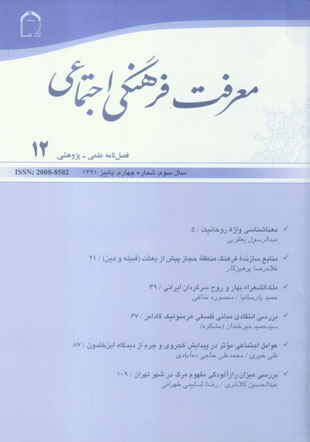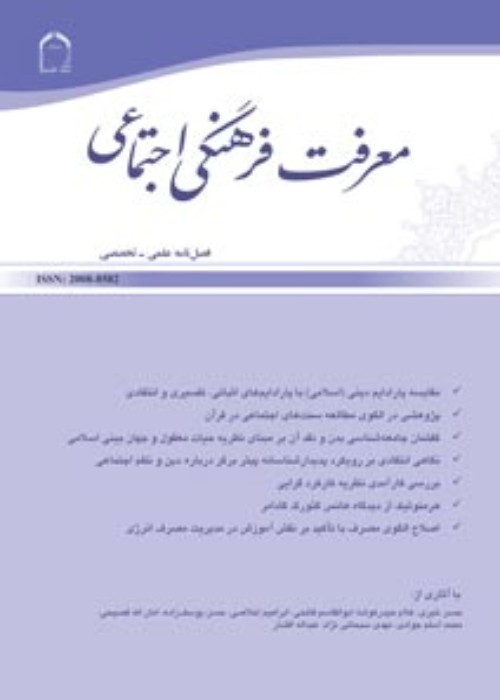فهرست مطالب

نشریه معرفت فرهنگی اجتماعی
سال سوم شماره 4 (پیاپی 12، پاییز 1391)
- 138 صفحه، بهای روی جلد: 10,000ريال
- تاریخ انتشار: 1392/07/20
- تعداد عناوین: 7
-
-
صفحه 5معناشناختی واژه روحانیت با بررسی واژگان روح، روحانی و روحانیت آغاز می شود. در بیشتر کاربردهای لغوی، روح به معنای روان و نفس است که معنایی مقابل جسم دارد. هنگامی که این واژه با موجودی دیگر همراه می شود، معنای موجودی معنوی، طیب و طاهر می گیرد. روح در معنای اصطلاحی آن، چه اصطلاح فلسفی و چه اصطلاح جامعه شناختی، یا حتی علوم دیگر، معانی مختلف می یابد. در فلسفه بر جوهر مجرد و نفس ناطقه و در جامعه شناسی بر دانش آموختگان علوم حوزه، اطلاق می شود.
معناشناختی این واژه با بررسی کاربرد آن در تاریخ ادبیات و کتاب های ایران، ادامه یافته است. این بررسی در پاسخ این پرسش که کاربرد این واژه از چه زمانی و چرا در تاریخ ادبیات ایران، برای اشاره به دانش آموختگان علوم حوزوی، به کار رفته است؟ سه تحلیل را به دست داده است: 1 مشابهت سازی شرق شناسان؛ 2 استعداد و ظرفیت عالمان شیعه برای تسری دادن معنای لغوی به آنان؛ 3 گذار روحانیت از حیات علمی به حیات اجتماعی.
کلیدواژگان: روح، روحانی، روحانیت، علما، مشروطه، معناشناسی -
صفحه 21این پژوهش در پی شناخت وضعیت فرهنگی منطقه حجاز پیش از بعثت پیامبر(ص) با توجه به شناخت منابع سازنده آن است. راهبرد روش شناختی برای دستیابی به منابع، مراجعه به آثار مورخان و شناسایی منابع اثر گذار بر فرهنگ پیش از بعثت است؛ سپس به تحلیل مفهومی یا کارکردی این منابع با توجه به اسناد تاریخی موجود می پردازیم تا به سازوکار عمل این منابع دست یابیم. حاصل این پژوهش دستیابی به چند منبع مهم و موثر در ساخت فرهنگ پیش از بعثت است. در این نوشتار دو مورد از آن، یعنی قبیله و دین و نقش آنها در ساخت فرهنگ منطقه حجاز بحث و بررسی می شود.
کلیدواژگان: منابع سازنده فرهنگ، منطقه حجاز، عصر پیش از بعثت، قبیله، دین -
صفحه 39شکست نظامی ایران از روسیه و انگلیس و نیز آشنایی گام به گام با استعمار و غرب پیشرفته در دو قرن اخیر، در تاریخ تفکر و اندیشه ایران شکافی عمیق ایجاد کرد که به رویارویی پیچیده سنت و مدرنیته انجامید. این تقابل که پس از ده ها سال کشمکش، همچنان ادامه دارد در دوره مشروطه تعین بخش اصلی صحنه سیاست و فرهنگ ایران بود و متفکران بسیاری را با ضرب آهنگ خود به این سو و آن سو کشاند. در این میان، ملک الشعراء بهار و امثال وی که در جریان نخستین برخوردهای سنت و مدرنیته، بیشتر به جانب مدرنیته و غرب ستایی می گرایند، به واسطه وابستگی اش به ادبیات، سنت ایرانی اسلامی را لنگ لنگان با خود حمل می کنند.
بدین ترتیب، آنچه این مقاله در پی بررسی آن خواهد بود، بررسی نظریات بهار درباره غرب و سنت بومی (تجدد و مدرنیته) با توجه به زمینه فکری و اجتماعی آن روزگار است تا از این رو برخی جریانات فکری موثر در تحولات معاصر جامعه ایران روشن تر شود.
کلیدواژگان: غرب، ایرانیت، هویت ملی، مذهب، سنت -
صفحه 67هرمنوتیک گادامر در ادامه دهنده هرمنوتیک هایدگر بوده، در پی شناخت ماهیت فهم و ساختار وجودی آن است، با این تفاوت که گادامر در این مسیر، برخلاف هایدگر، به مسائلی چون فهم متون و آثار هنری، تفسیر امور تاریخی و روش شناسی علوم انسانی نیز پرداخت، بی آنکه درصدد عرضه روش شناسی جدیدی درباره این علوم باشد. می توان گفت مباحث هرمنوتیک فلسفی گادامر که با بحث انسان شناسی مرتبط است، به مثابه یکی از مباحث عمده فلسفی است.
در این نوشتار، از دیدگاه های او درباره انسان و فهم، انسان و تاریخ و انسان و زبان بحث می شود؛ سپس این دیدگاه ها بر اساس دیدگاه اسلامی نقد خواهد شد. گرچه دو عنوان آخر در مباحث وی در تحلیل فهم انسانی، یعنی عنوان اول مندرج است، لیکن برای امکان بررسی و نقد دیدگاه های او درباره تاریخ، فرهنگ و زبان این تفکیک صورت پذیرفته است.
کلیدواژگان: فهم، متن، تاریخ، تاریخ موثر، سنت، زبان -
صفحه 87نوشتار حاضر می کوشد موثرترین عوامل اجتماعی جرم از دیدگاه ابن خلدون را با نگاهی به مهم ترین نظریه های جرم شناسی بررسی کند.
ابن خلدون از سویی به اختیار انسان باور دارد و از سوی دیگر، با پذیرفتن اجتماعی بودن انسان، تاثیر عوامل محیطی و اجتماعی را بر عملکرد او می پذیرد؛ ازاین رو، به عوامل گوناگونی همچون تجمل گرایی و تضاد منافع، بیداد حاکمان، سستی هم بستگی های اجتماعی، جنگ های داخلی و خارجی توجه دارد و این عوامل را سبب وقوع جرایم بی شماری، از جمله مفاسد اقتصادی، قتل، جرایم جنسی و شورش های اجتماعی می داند.
دیدگاه ابن خلدون در تحلیل عوامل اجتماعی جرم به نظریه های تلفیقی و ترکیبی نزدیک تر است؛ اما او تجمل گرایی و بروز تضاد میان شهرنشینان را زمینه ساز بسیاری از جرایم برمی شمارد و از میان همه عوامل اجتماعی جرم، توجه ویژه ای به دولت و مفاسد سیاسی و اقتصادی آن دارد.
کلیدواژگان: ابن خلدون، عصبیت، پدیده های مجرمانه، شهرنشینی، اجتماع، دولت، نظریه های جرم شناسی -
صفحه 109نوشتار حاضر، در پی آن است که با تحلیل و تبیین میزان رازآلودگی مفهوم مرگ در شهر تهران، شاخص های اجتماعی مرتبط با آن را بررسی کند. برای این منظور، پس از مطالعه ای مختصر درباره نظریات موجود، نظریه تمدن نوربرت الیاس را مبنای نظری این پژوهش قرار دادیم. سپس با توجه به تحلیل نظری و با استفاده از گزارش ها و آمار موجود، میزان غرابت مفهوم مرگ در شهر تهران و شاخص های مختلف اجتماعی آن تحلیل و تبیین شده اند. براین اساس، به نظر می رسد، میزان چشمگیری از رازآلودگی و غرابت مفهوم مرگ در شهر تهران مشاهده شدنی است؛ هرچند این موضوع در مقایسه با وضعیت جوامع غربی، عمومیت و گسترش بسیار کمتری دارد. در همین باره، نوشته پیش رو پیشنهادهایی برای کاهش رازآلودگی مزبور ارائه می دهد؛ از جمله این موارد تاکید بر تقویت معانی دینی و جمعی، تقویت مراسم جمعی تشییع، تدفین و ترحیم و نیز توسعه فرهنگ همدلی و همجوشی با سال خوردگان و محتضران است.
کلیدواژگان: رازآلودگی مرگ، تنهایی محتضران، خانه های سالمندان، مراسم تشییع، تدفین و ترحیم درگذشتگان، گورستان های شهری -
الخلاصهصفحه 127
-
Page 5The semantics of the term "spirituality" begins with reviewing the terms spirit, spiritual and spirituality. In its most literal applications, the term spirit means soul and psyche which has an opposite meaning to body. When it is used as an adjective for another entity, this entity takes the meaning of a spiritual and pure entity. The term "spirit" in its technical meaning, whether philosophical or sociological or even in other sciences, has different meanings. In philosophy, it refers to immaterial substance and intellective soul and in sociology to those who graduated in seminary sciences. The semantics of this term continues by reviewing its application in the history of literature of Iran and Persian books. In answering the question when and why the term "spiritual" has been applied to those who graduated in seminary sciences in the history of literature of Iran, the present paper provides three analyses: 1- similarities made by Orientalists; 2- Shiite scholar's capacity for applying the term to them; 3- religious scholar's transition from intellectual life to social life.Keywords: spirit, spiritual, spirituality, religious scholars, Constitution, semantics
-
Page 21The present paper seeks to recognize the cultural condition of Hejaz region before Holy Prophet's mission with regard to its constituent sources. As its method, is refers to historian's works and recognize sources influencing the culture before Holy prophet's mission. Then, it offers a conceptual or applied analysis of these sources with regard to existing historical documents in order to find the modus operand of these sources. The research findings are some important and influential sources in forming the culture before Holy Prophet's mission. This paper sheds light on two sources, i.e. tribe and religion which played role in forming the culture of Hejaz region.Keywords: constituent sources of culture, Hejaz region, period before Holy Prophet's mission, tribe, region
-
Page 39Military defeat of Iran by Russia and Britain and gradual familiarity with colonialism and developed West during two recent centuries made a deep gap in Iran's history of thinking which led to the confrontation between tradition and modernity. This confrontation which still continues after many years of conflict had a determining role in the political and cultural scene of Iran during Constitutional revolution period, and pulled many thinkers towards different directions with its rhythm. In the meantime, Malek Al-Shoara' Bahar and some other scholars like him who inclined towards modernity and westernization during first confrontations between tradition and modernity carried Islamic-Iranian tradition haltingly, due to his connection to literature. So, the present paper seeks to study Bahar's views on West and native tradition (modernism and modernity) with regard to the intellectual and social context of that time in order to shed light on the intellectual trends influencing contemporary developments in Iran's society.Keywords: West, being Irani an, national identity, religion, tradition
-
Page 67Gadamer's hermeneutics continues Heidegger's hermeneutics and seeks to recognize the nature of understanding and its existential structure. However, contrary to Heidegger, Gadamer deals with such issues as understanding artistic works and texts, interpretation of historical affairs and methodology of human sciences without seeking to provide a new methodology for these sciences. It can be said that Gadamar's philosophical hermeneutics which is related to anthropology is among the main philosophical issues. The present paper discusses his views about man and understanding, man and history, and man and language. Then criticizes these views based on Islamic view. Although two last titles (man and history, and man and language) are subtitles of the first one (man and understanding), they are divided in order to make possible the analysis and criticism of his views about history, culture and language.Keywords: understanding, text, history, influential history, tradition, language
-
Page 87The present paper seeks to investigate the most influential social factors of crime in Ibn Khaldun's view through looking at the most important theories of criminology. On the one hand, Ibn Khaldun believes in man's will and admits the effect of environmental and social factors on man's acts by accepting his sociability, on the other hand. Therefore, he pays attention to different factors like luxury- orientation and interest conflict, ruler's oppression, weakness of social cohesion, and civil and foreign wars and considers these factors as the cause of many crimes including economic corruptions, murder, sexual offences, and social riots. Inb Khaldun's approach to analyzing the social factors of crime is more close to integrative and combinative theories. However, he considers luxury-orientation and conflict among city dwellers as the cause of many crimes, and, among all social factors, pays special attention to state and its political-economic corruptions.Keywords: Inb Khaldun, asabiyyah (social cohesion, tribalism), criminal phenomena, urbanism, society, state, theories of criminology
-
Page 109Through analyzing and elaborating on the scale of mysteriousness of death concept in Tehran City, the present paper tries to study its relevant social parameters. To this end, the author has chosen Norbert Elias's theory of civilizing as the theoretical basis of this research after a brief review of existing theories. Then the scale of strangeness of death concept in Tehran City and its different social parameters are analyzed and expounded regarding theoretical analysis and using existing reports and figures. Accordingly, it seems that a considerable scale of mysteriousness and strangeness of death concept in Tehran City is observable, although it is much less common and spread in comparison with western societies. In this regard, this paper puts forward some suggestions to decrease this mysteriousness, including emphasis on reinforcing religious and communal meanings, reinforcing communal funeral and burial ceremony and expanding the culture of sympathy and intimacy with elderly and those who are dying.Keywords: mysteriousness of death, loneness of those who are dying, retirement home, funeral, burial ceremony for dead, city cemeteries


